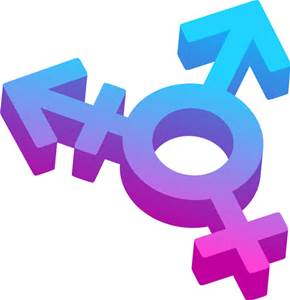The Great Importance of a Little Pronoun
Posted on May 23, 2016
2 comments 2258 Views
Being Aware of Students’ Preferred Pronouns
By Kathryn Ayres

In the midst of the North Carolina House Bill 2, the Public Facilities Privacy & Security Act, and the most recent Target boycott, the conversation around what it means to be transgender has reached a heightened level of awareness in our country. The issue in both of these examples hinges on the use of public restrooms, but encompasses the broader issue of gender identity.
Imagine you are looking at two blue signs. Not defined by any other features, one sign depicts an individual wearing pants and the other sign an individual wearing a dress or skirt. Which of these would you most closely align with? Aside from clothing, these restroom signs do not dictate whether or not the head above them is biologically male or female. Our society has defined these signs the designation of the pants wearing individual to male and the dress wearing individual to female. This familiar definition does not take into account the gender identity an individual feels.
A very basic question of self-identity
The bathroom they choose to go into is just one issue faced by a transgender individual. The other, very basic question is how they identify their own gender, and the pronoun they prefer.
 One of the questions Western Oregon
University can ask in regards to this issue, in hopes of creating a more
comfortable atmosphere, is why being aware of a students’ preferred gender
pronoun is important on campus. To answer this question, I turned to the Director
of Abby’s House, Center for Women and Families, Dr. Mary Ellen Dello Stritto.
One of the questions Western Oregon
University can ask in regards to this issue, in hopes of creating a more
comfortable atmosphere, is why being aware of a students’ preferred gender
pronoun is important on campus. To answer this question, I turned to the Director
of Abby’s House, Center for Women and Families, Dr. Mary Ellen Dello Stritto.
“Bottom line,” Dello Stritto said, “we need to be an inclusive campus, we need to be and generally are, but there is always room for growth.” It is impossible to always know what pronoun each individual is interested in going by. For Dr. Dello Stritto, “this is all about inclusion.”
Preferred gender pronouns (PGP)
Consciousness of individual’s preferred gender pronouns (PGP) has become a more prevalent concern on college campuses recently, as seen in a myriad of different articles this past fall from USA Today, National Review, and dozens of college newspapers. As seen in recent news stories, it is also crossing over to be an issue off campus, into public spaces as well.
The steps that faculty, staff, and other individuals around campus can take to be aware of this are simpler than one might think. Just ask.
The practice of calling roll on the first day of class and asking that each student give their preferred pronoun, “creates an equitable environment, and the transgender individual doesn’t stick out, and that becomes the norm,” said Dello Stritto.
Asking for PGP is more common in gender studies classes
 Having taught for 16 years, Dr. Dello
Stritto knows that asking for the PGP is more common in gender studies classes.
“I’m not sure if this is happening in the classroom, where students have the
most concerns,” Dello Stritto continued. “It’s a burden for students to make private
meetings with professors [to discuss this]. If we open with ‘give me your
pronoun’ it reduces the burden and sends a message of inclusion.”
Having taught for 16 years, Dr. Dello
Stritto knows that asking for the PGP is more common in gender studies classes.
“I’m not sure if this is happening in the classroom, where students have the
most concerns,” Dello Stritto continued. “It’s a burden for students to make private
meetings with professors [to discuss this]. If we open with ‘give me your
pronoun’ it reduces the burden and sends a message of inclusion.”
Dello Stritto reflected on the resistance to this change. She addressed the people who might say, “Do we really need to do that?” “Isn’t it a small number?” “What are the odds?” Her answer is, “It’s a good practice and it makes us think about being inclusive, having appropriate practices, and thinking of gender in a different way rather than the traditional sense of checking the boxes of male and female.”
Respecting each person's sense of self
Dr. Dello Stritto’s response to how this can be exemplified on Western’s campus does not have to end at the boundaries of this college. The practices of inclusion and adopting appropriate practices allows for the individuals choosing bathrooms in North Carolina or at Target to feel welcome to use the one that they feel fits their personal definition. It allows all people to feel included when being referred to with their preferred pronoun, and allows for college campuses, and the outside world, to respect each person’s sense of self.
Kathryn Ayres is a Project Assistant at TRI. She graduated from Pacific Lutheran University in May of 2015 with a Bachelor of Arts in Political Science and Environmental Studies. Kate started working with TRI in October of 2015, and will be leaving soon to pursue a Master's degree in Environmental Policy.
Transgender graphic by blueboat.blogs.uua.org
Recent Blog Posts
Project Spotlight: Creating Supports for Survivors of Gender-Based Violence Jun 6, 2018
Project Spotlight: Investigating Executive Function Concerns in Infants and Toddlers May 23, 2018
Project Spotlight: Reaching Out to an Underserved Population May 9, 2018
Project Spotlight: Fighting Against Gender-Based Violence Mar 14, 2018
Project Spotlight: Increasing Diversity in Early Childhood Educators Feb 7, 2018
2 Comments
Insightful connection between what's happening in other state's policies and local supports on WOU's campus. Thank you.
Kate and Mary Ellen, thank you for this article! Well done and timely.
Posted May 25, 2016 by Pat Ketcham